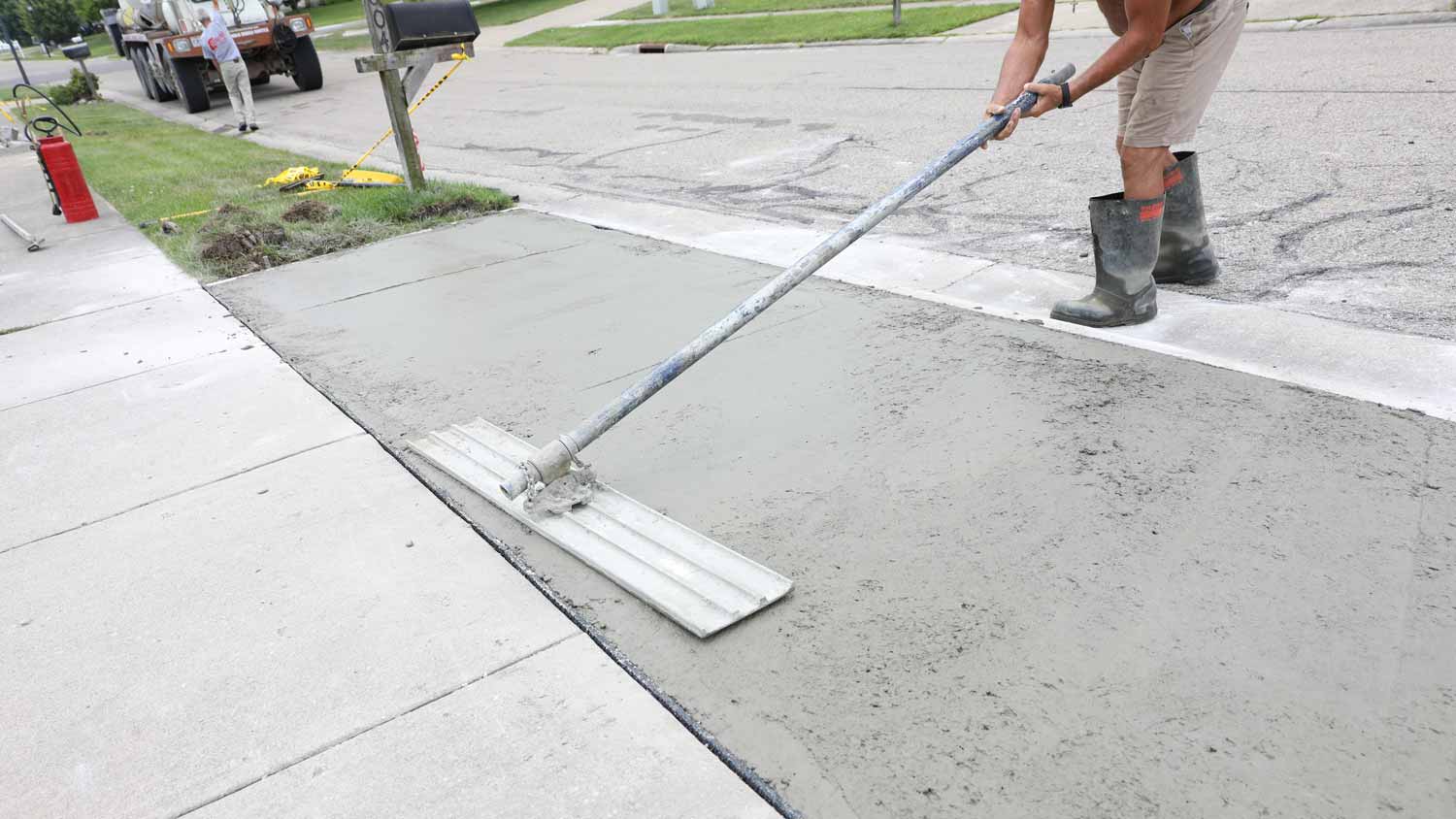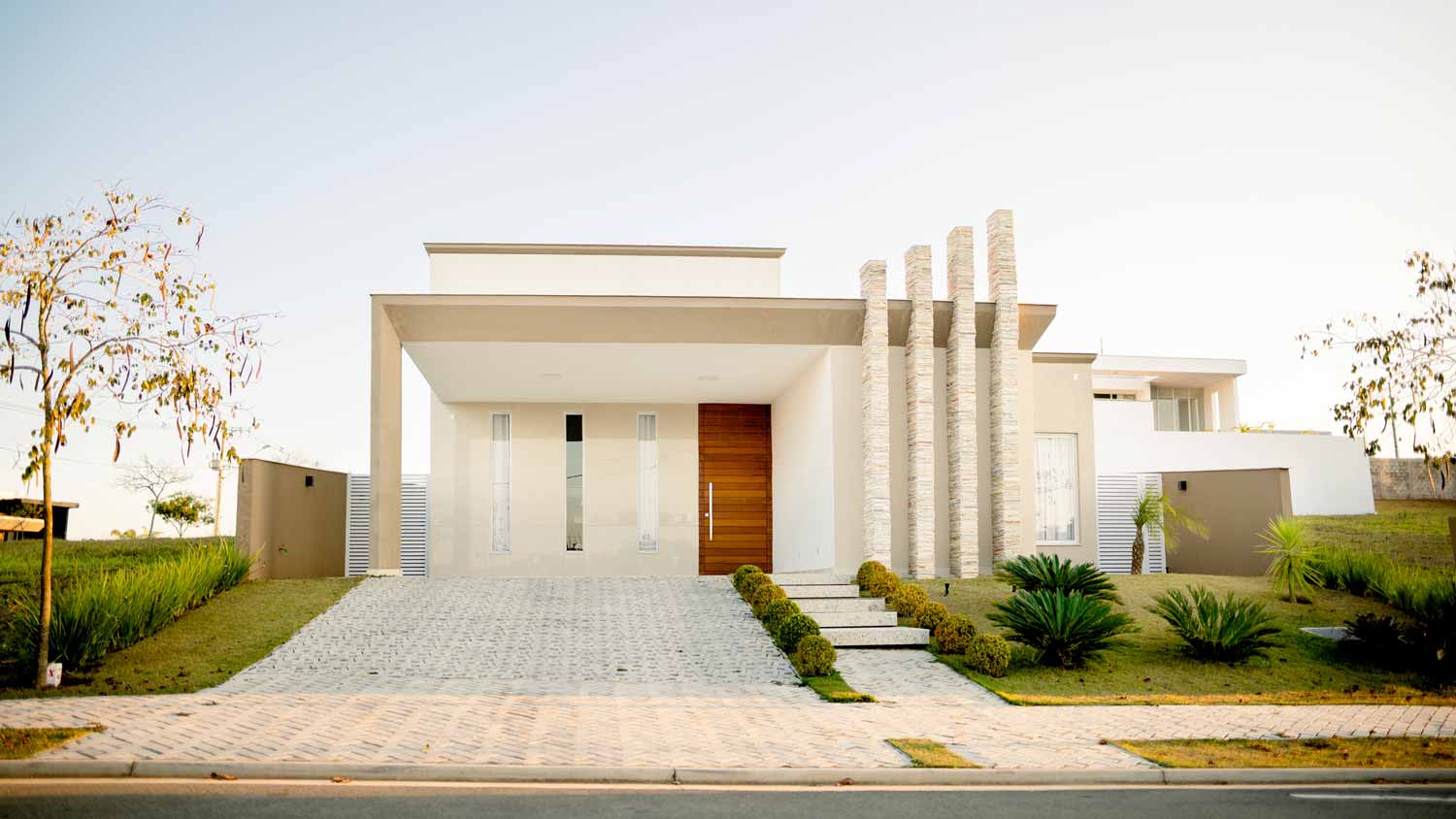How to Calculate the Cost of a Driveway Apron
On average, a driveway apron costs $4,400 and as little as $1,300 on the low end, while larger installations can go as high as $7,800.


Your HOA and local laws will specify your driveway apron's size, slope, and width.
Driveway apron costs depend on the material of the rest of your driveway; pavers cost more per square foot than concrete or asphalt.
You may need to install additional drainage, such as culverts, to direct the driveway runoff.
Hiring an experienced contractor ensures you install the apron up to local codes to avoid fines.
There are very few spots where your property overlaps with public access areas—but the driveway apron is one of them. So, what is a driveway apron? Also referred to as the driveway approach, the driveway apron is the sloped entryway that connects your driveway and the road. Installing a driveway apron costs anywhere from $1,300 on the low end to $7,800 for a large installation with rebar, culverts, and decorative pavers, with $4,400 being the average cost.
Driveway Apron Cost Factors

Driveway aprons may be a relatively small installation, but the process can be tricky due to their slope and the specifications of local laws. Due to both of these, it's often best to work with a local driveway paving company to avoid confusion or breakage down the line.
Size
Driveway apron sizes span between 180 and 432 square feet on average. This breaks down to between 15 and 18 feet long and between 12 and 24 feet wide. Driveway aprons will run the width of your driveway and the length between the end of the driveway and the street. Prices, of course, can vary if:
Your driveway apron crosses over a sidewalk
You have a longer space between your driveway and the road
Your town covers the cost of part of the driveway apron
You town set specific size requirements for your city
You have a wider or narrower driveway than the standard sizes
The price to pave a driveway apron by square foot is similar to the cost of paving a driveway, with a bit extra for some installations. Materials and labor combined come out to $2 and $15 per square foot on average, or up to $50 per square foot for high-end pavers. Combined with the average apron size, this brings the total to between $1,300 to $7,800, or an average of $4,400.
Materials
In most cases, homeowners choose to match the apron with the rest of the driveway. On average, you'll pay between $3 and $10 for materials and an extra $4 to $8 for installation. However, always be sure to check local building codes in case you are required to use concrete, asphalt, or something similar. You may also be required to add a permeable layer of gravel below your top layer to ensure proper drainage.
Labor
Driveway paving companies set their rate by hour, square foot, or with a flat fee for small jobs. Overall, price ranges fall between $4 and $8 per square foot, but prices will break down differently depending on the material. For example, the price of installing a concrete driveway includes an average of $135 per cubic yard to deliver the concrete, $1.75 per square foot to pour it and $10.50 per square foot for special finishes such as stamping.
In other words, the labor portion of your driveway apron cost will vary widely depending on the material. You can assume that it will account for between 50% and 60% of the total cost.
Permits
Once you cross into public access areas, you will need a permit to install a driveway apron. Permits cost between $50 and $200 on average, however, you may pay more if you also need to add the curb cut—the open space in the curb that makes it easier for your car to enter the driveway.
Not sure who pays for permits? Ask your contractor if they’ll handle the process of getting the permit—and if it’s included in the quoted cost they gave you.
Local Building Laws
Are you curious if you need to pay for your own driveway apron costs? Always check local building codes before starting this project, even if you are budgeting costs to repave your driveway. Your town may pay for all or some of the price. They may also leave the apron costs to you but still have specific requirements about its placement, size, and materials.
Driveway Apron Material Prices

Some driveway apron materials are easier to install than others but remember to always follow local laws when choosing one.
Concrete
Concrete driveways cost between $8 and $18 per square foot to install on average, meaning that a small apron will cost just under $1,440, and a larger one can cost up to $7,800. The higher price accounts for stamped concrete, permeable concrete, and added specialties like strengthening rebar or drainage.
Asphalt
Asphalt driveway installation prices range from $7 to $12 per square foot or between $1,300 and $5,200 for an apron before permits and drainage. Prices increase for aprons on steep grades or that require permeable materials.
Pavers
In some towns, you can extend specialty paving materials right from your driveway to your lawn. Pavers typically range from $10 to $50 per square foot, especially if you install natural stone. Pavers, which are costly to purchase and install, can extend that unique style of your home right to the street.
Additional Costs to Consider

Any paved area that cuts through your yard or a public area often requires specific design, reinforcement, or drainage to ensure it melds with the surrounding landscape.
Drainage
Local municipal codes will dictate several details related to stormwater drainage when it comes to your driveway apron. The slope of your apron and driveway, for example, determines how water runs into nearby storm drains.
Additionally, you may need to install or replace the culvert below your driveway—the pipe or channel that directs water under your driveway and out into the drain. You'll pay an average of $4,500 to replace it, but be sure to check if your town is responsible for its upkeep.
Lastly, your town may require you to add a permeable layer of gravel or similar aggregate below a paved driveway apron to encourage drainage. Gravel prices run at an average of $65 per yard and about $30 an hour to spread it, though your installation team will likely include this in their estimate.
Still worried about drainage? Read up on these common driveway drainage solutions for your home.
Reinforcement
You or your town may decide that your driveway apron requires wire mesh or metal rebar for extra reinforcement. Rebar prices for concrete projects cost between $2 and $3 per foot, including installation.
Curb Cut
Always check with local codes when adjusting the curb for your driveway apron. In a major city, you will likely encounter strict laws around who adjusts the curb and how it's done. If you're responsible for cutting the curb, add several hours of labor at your contractor's rate.
Cost to Install a Driveway Apron Yourself
So, can you really lower the cost of your driveway apron by installing it yourself? It depends. Always begin by checking local laws about who is allowed to install your driveway apron. In many cases, you will only be able to pull a permit when you hire a licensed contractor. In other cases, the city will handle every step of the process.
If you get the go-ahead from your town, we recommend still hiring an experienced pro. While learning how to mix concrete for small jobs is doable, pouring it for weight-bearing areas like a driveway apron is quite advanced. If you are comfortable with the complex work, you can save between $4 and $8 per square foot, but only if you're certain you can avoid costly errors.
How to Save Money on Driveway Aprons
The best way to keep the cost of your driveway apron low is to check local building codes before you begin. If you live in an area with strict building codes, avoiding fees is key. If you have a bit more flexibility, here are some ways to cut driveway apron costs:
Opt for concrete or asphalt over pavers
Avoid a steep slope when possible to lower installation costs
Shop around for at least three estimates from contractors
Avoid summer installation since it's the high season for driveway installation
Install the apron at the same time as your driveway
How Angi Gets Its Cost Data
Home is the most important place on earth, which is why Angi has helped more than 150 million homeowners transform their houses into homes they adore. To help homeowners with their next project, Angi provides readers with the most accurate cost data and upholds strict editorial standards. We extensively research project costs to develop the pricing data you see, so you can make the best decisions for you and your home. We rely on reputable sources, including the U.S. Bureau of Labor Statistics, academic journals, market studies, and interviews with industry experts—all to ensure our prices reflect real-world projects.
Want to help us improve our cost data? Send us a recent project quote to [email protected]. Quotes and personal information will not be shared publicly.
Both concrete and asphalt are appropriate for your driveway apron. The choice often comes down to local laws and the current material of your driveway. In some cases, your town may require you to install wire mesh or rebar to fortify the material, but both are common in apron installation.
Driveway aprons range between 15 and 18 feet long and 12 and 24 feet wide. However, both measurements depend on the width of your driveway and the distance between the end of the driveway and the road. In some cases, you will not be responsible for any apron that goes beyond the sidewalk, but it depends on local laws.
Driveway aprons typically range between four and seven inches thick, though your town's building codes will likely have specific requirements. Additionally, you may need to add a layer of permeable aggregate in the excavation below your paved apron to ensure proper stormwater drainage.
Concrete is often the default material for a driveway apron, and many local building codes may require this. If you’re not restricted to concrete, however, you can consider alternative driveway apron ideas, such as asphalt, pavers, or gravel. You can also stamp the concrete for an interesting texture, add color to the concrete for a little extra character, or add a swirled trowel finish to your concrete driveway apron.















